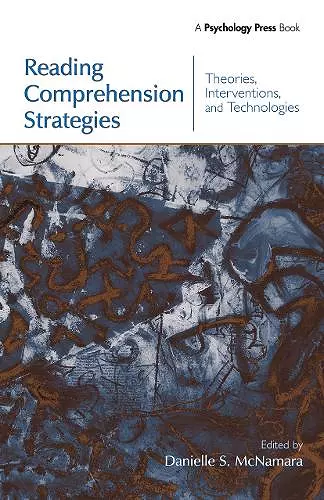Reading Comprehension Strategies
Theories, Interventions, and Technologies
Format:Hardback
Publisher:Taylor & Francis Inc
Published:24th May '07
Currently unavailable, and unfortunately no date known when it will be back
This hardback is available in another edition too:
- Paperback£63.99(9780805859676)

First published in 2007. The focus of this book is on the cognitive processes involved in comprehension, and moreover, on techniques that help readers improve their ability to comprehend text and it is also on reading comprehension strategies. Indeed, the use of effective reading comprehension strategies is perhaps the most important means to helping readers improve comprehension and learning from text.
“What an exciting discovery, to find a book containing so many outstanding chapters on reading comprehension, many of which were written by the world's most famous scholars on this topic. For those who want to find out how the mind works as the reader engages in the most mysterious task of making sense out of what is printed on a page, and for those who want to find ways to increase the reading comprehension of their students, this book is essential reading.” - Jay Samuels, National Reading Panel
“This volume represents the state of the art in connecting theories of readers’ cognitive processes with practical interventions for improving their comprehension. In a field of study that is notoriously complex and hard to synthesize, “Reading Comprehension Strategies” is a useful guidebook to what is known, how we might best conceive of the problems, and what kinds of new approaches are finding empirical support. The serious exploration of how new technologies can support readers of different sorts in becoming better readers will be particularly intriguing for anyone concerned with the future of literacy education.” - Michael Schober, New School for Social Research
“There is no doubt that reading is fundamental, and basic literacy skills are critical for learning to read, but the ultimate goal of reading is comprehension. This collection discusses how we may move readers past "literal" comprehension toward conceptual understanding of content-area knowledge. The chapters focus on strategy instruction and comprehension assessment and serve as excellent contributions to our knowledge of how we may best promote "reading to learn".”- Jennifer Wiley, University of Illinois at Chicago
“Reading Comprehension Strategies: Theory, Interventions, and Technologies presents a readable account of the current state of comprehension research. The authors represent some of the most productive researchers in the field, each discussing two critical concerns that are traditionally considered separately: (1) They outline their specific investigations into the mechanisms that underlie comprehension, and (2) They assess ways in which the operation of these mechanisms might indicate useful remediative strategies and technologies to address comprehension difficulties. The resulting volume is an excellent resource for individuals in the diverse fields of education, cognition, and instructional design.” - David, N. Rapp, Northwestern University
“What an exciting discovery, to find a book containing so many outstanding chapters on reading comprehension, many of which were written by the world's most famous scholars on this topic. For those who want to find out how the mind works as the reader engages in the most mysterious task of making sense out of what is printed on a page, and for those who want to find ways to increase the reading comprehension of their students, this book is essential reading.”
—Jay Samuels
National Reading Panel
“This volume represents the state of the art in connecting theories of readers’ cognitive processes with practical interventions for improving their comprehension. In a field of study that is notoriously complex and hard to synthesize, “Reading Comprehension Strategies” is a useful guidebook to what is known, how we might best conceive of the problems, and what kinds of new approaches are finding empirical support. The serious exploration of how new technologies can support readers of different sorts in becoming better readers will be particularly intriguing for anyone concerned with the future of literacy education.”
—Michael Schober
New School for Social Research
“There is no doubt that reading is fundamental, and basic literacy skills are critical for learning to read, but the ultimate goal of reading is comprehension. This collection discusses how we may move readers past "literal" comprehension toward conceptual understanding of content-area knowledge. The chapters focus on strategy instruction and comprehension assessment and serve as excellent contributions to our knowledge of how we may best promote "reading to learn".”
—Jennifer Wiley
University of Illinois at Chicago
“Reading Comprehension Strategies: Theory, Interventions, and Technologies presents a readable account of the current state of comprehension research. The authors represent some of the most productive researchers in the field, each discussing two critical concerns that are traditionally considered separately: (1) They outline their specific investigations into the mechanisms that underlie comprehension, and (2) They assess ways in which the operation of these mechanisms might indicate useful remediative strategies and technologies to address comprehension difficulties. The resulting volume is an excellent resource for individuals in the diverse fields of education, cognition, and instructional design.”
—David, N. Rapp
Northwestern University
ISBN: 9780805859669
Dimensions: unknown
Weight: 952g
538 pages